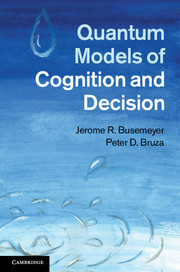Book contents
- Frontmatter
- Contents
- Preface
- Acknowledgments
- 1 Why use quantum theory for cognition and decision? Some compelling reasons
- 2 What is quantum theory? An elementary introduction
- 3 What can quantum theory predict? Predicting question order effects on attitudes
- 4 How to apply quantum theory? Accounting for human probability judgment errors
- 5 Quantum-inspired models of concept combinations
- 6 An application of quantum theory to conjoint memory recognition
- 7 Quantum-like models of human semantic space
- 8 What about quantum dynamics? More advanced principles
- 9 What is the quantum advantage? Applications to decision making
- 10 How to model human information processing using quantum information theory
- 11 Can quantum systems learn? Quantum updating
- 12 What are the future prospects for quantum cognition and decision?
- Appendices
- References
- Index
3 - What can quantum theory predict? Predicting question order effects on attitudes
Published online by Cambridge University Press: 05 August 2012
- Frontmatter
- Contents
- Preface
- Acknowledgments
- 1 Why use quantum theory for cognition and decision? Some compelling reasons
- 2 What is quantum theory? An elementary introduction
- 3 What can quantum theory predict? Predicting question order effects on attitudes
- 4 How to apply quantum theory? Accounting for human probability judgment errors
- 5 Quantum-inspired models of concept combinations
- 6 An application of quantum theory to conjoint memory recognition
- 7 Quantum-like models of human semantic space
- 8 What about quantum dynamics? More advanced principles
- 9 What is the quantum advantage? Applications to decision making
- 10 How to model human information processing using quantum information theory
- 11 Can quantum systems learn? Quantum updating
- 12 What are the future prospects for quantum cognition and decision?
- Appendices
- References
- Index
Summary
Can one really predict something new and interesting using quantum theory in the social or behavioral sciences? Consider the law of reciprocity described in Chapter 2: according to this law, the probability of transiting from one state to another is equal to the probability of making this transition in the opposite direction. Now this symmetrical property is a pretty bold prediction to make in the social and behavioral sciences. Does this really work?
To answer this question, in this chapter we empirically test this law by applying the quantum principles to an important empirical problem concerning the effects of question order on attitude judgments. For example, suppose you are asked “How happy are you with life in general?” This question could be preceded or followed by the question “How happy are you with your marriage?” If the marriage question comes first, then the happiness rating for the general life question tends to be substantially depressed, producing a large order effect (Tourangeau et al., 1991). Quantum physics was originally developed to understand how measurement affects the system under investigation, which led to Heisenberg's famous uncertainty principle. The potential reactivity to measurement by the person being measured has an even longer history in psychology (Tourangeau et al., 2000).
The effects of question order have been an important issue to survey researchers interested in studying beliefs and attitudes (Schuman & Presser, 1981). Measurement of a belief or attitude directs attention to a subset of a person's knowledge, which is then used in guiding subsequent judgments.
- Type
- Chapter
- Information
- Quantum Models of Cognition and Decision , pp. 99 - 116Publisher: Cambridge University PressPrint publication year: 2012



